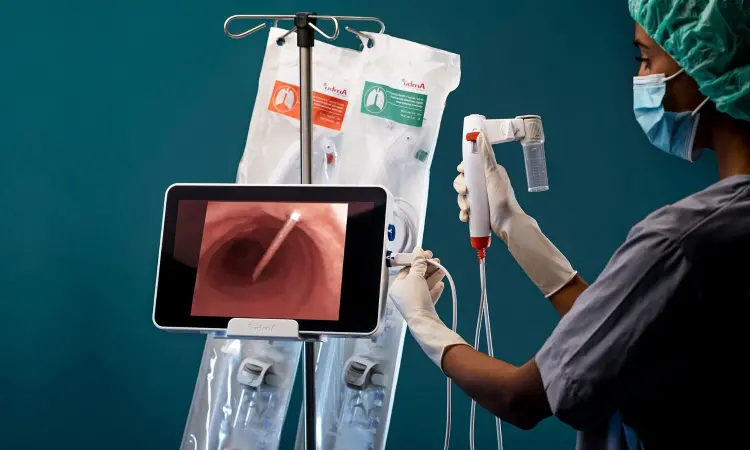- Home
- Medical news & Guidelines
- Anesthesiology
- Cardiology and CTVS
- Critical Care
- Dentistry
- Dermatology
- Diabetes and Endocrinology
- ENT
- Gastroenterology
- Medicine
- Nephrology
- Neurology
- Obstretics-Gynaecology
- Oncology
- Ophthalmology
- Orthopaedics
- Pediatrics-Neonatology
- Psychiatry
- Pulmonology
- Radiology
- Surgery
- Urology
- Laboratory Medicine
- Diet
- Nursing
- Paramedical
- Physiotherapy
- Health news
- Fact Check
- Bone Health Fact Check
- Brain Health Fact Check
- Cancer Related Fact Check
- Child Care Fact Check
- Dental and oral health fact check
- Diabetes and metabolic health fact check
- Diet and Nutrition Fact Check
- Eye and ENT Care Fact Check
- Fitness fact check
- Gut health fact check
- Heart health fact check
- Kidney health fact check
- Medical education fact check
- Men's health fact check
- Respiratory fact check
- Skin and hair care fact check
- Vaccine and Immunization fact check
- Women's health fact check
- AYUSH
- State News
- Andaman and Nicobar Islands
- Andhra Pradesh
- Arunachal Pradesh
- Assam
- Bihar
- Chandigarh
- Chattisgarh
- Dadra and Nagar Haveli
- Daman and Diu
- Delhi
- Goa
- Gujarat
- Haryana
- Himachal Pradesh
- Jammu & Kashmir
- Jharkhand
- Karnataka
- Kerala
- Ladakh
- Lakshadweep
- Madhya Pradesh
- Maharashtra
- Manipur
- Meghalaya
- Mizoram
- Nagaland
- Odisha
- Puducherry
- Punjab
- Rajasthan
- Sikkim
- Tamil Nadu
- Telangana
- Tripura
- Uttar Pradesh
- Uttrakhand
- West Bengal
- Medical Education
- Industry
Single-use bronchoscopes associated with lower costs, fewer readmissions during bronchoscopy: Study

USA: A recent study has revealed that adopting a single-use flexible bronchoscope (SFB) can reduce readmission rates by over half, and potentially lower costs during bronchoscopies, a common endoscopy procedure. The results add to the growing body of evidence of the benefits of SFB over reusable flexible bronchoscopes (RFB) suggesting that all hospitals should use single-use bronchoscopy as the standard of care, given the financial, clinical, and operational benefits.
The study results were presented at the annual meeting of the American College of Chest Physicians, which took place virtually from October 17 to 20 and was subsequently published in the CHEST journal.
Improper reprocessing of bronchoscopes is known to pose a serious patient safety and infection risk. Previous studies have reported the risk of patient infection resulting from the use of contaminated bronchoscopes to be 2.8%. SFB has been introduced recently as an alternative to RFB. By virtue of being sterile, SFB may reduce the infection risk, subsequent readmission rates, and associated costs while enhancing operational efficiency.
"We know when patients go in for bronchoscopy that there is always that potential risk of an infection," said study author John Hudson Garrett Jr., PhD, of the University of Louisville School of Medicine in Kentucky, during his presentation of the data. "The infection can be related either to the healthcare environment itself or to the device, in this case, the bronchoscope. … The literature as well as [Manufacturer and User Facility Device] MAUDE reports from the FDA and the most recent FDA safety alert have documented that reprocessing of reusable devices continues to play a risk … of reprocessing failure that subsequently increases mortality and morbidity. There have been over 500 reports of adverse events associated with reprocessing failures with bronchoscopy alone."
"To reduce these risks, the use of a sterile SFB should be considered to eliminate reprocessing failures, improve overall operational efficiency, and reduce potential acquisition of healthcare-associated infections," the authors wrote. "Recent data from FDA 522 studies in the gastrointestinal clinical setting has demonstrated the widespread risks associated with reusable flexible endoscopes. These lessons learned must be adapted to the clinical procedure of bronchoscopy, especially in an era of an ongoing global pandemic."
For the study, the researchers identified bronchoscopies with SFB and RFB along with their corresponding readmission information in the Premier Healthcare Database (PHD) from 2016-2019. Summary statistics were calculated on readmissions segmented by scope type and clinical setting.
A total of 14,228 procedures identified, of which 1,795 used SFB and 12,433 used a RFB (9,401 outpatient and 4,827 inpatient).
The study revealed the following findings:
- In the inpatient setting, the RFB group was ~2.5 times more likely to be readmitted within 30 days compared to the SFB group (OR=2.5), controlling for patient demographics and risk.
- In the outpatient setting, the RFB group was ~1.5 times more likely to be readmitted than the SFB group (OR=1.5).
- Across all settings, the RFB group was ~2.3 times more likely to be readmitted than the SFB group (OR=2.3).
- The inability to fully risk-adjust in the outpatient setting may have been a factor in the smaller OR and lack of statistical significance; this limitation will be addressed with further analysis that includes an outpatient severity of illness classification variable.
"The data analysis demonstrates significant clinical benefits of SFB in reducing readmissions and risks," the authors concluded.
Reference:
The study titled, "STERILE, SINGLE-USE BRONCHOSCOPE REDUCES ASSOCIATED READMISSION RATES AND INFECTION RISK: A RETROSPECTIVE CLINICAL ANALYSIS," is published in the CHEST journal.
Dr Kamal Kant Kohli-MBBS, DTCD- a chest specialist with more than 30 years of practice and a flair for writing clinical articles, Dr Kamal Kant Kohli joined Medical Dialogues as a Chief Editor of Medical News. Besides writing articles, as an editor, he proofreads and verifies all the medical content published on Medical Dialogues including those coming from journals, studies,medical conferences,guidelines etc. Email: drkohli@medicaldialogues.in. Contact no. 011-43720751


